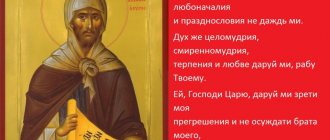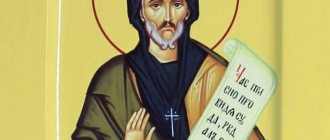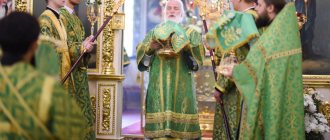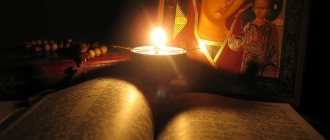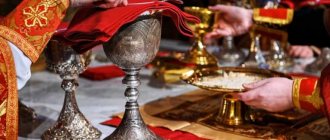Being a Christian is not just about going to church once a week. A person's whole life must change. Every task must be covered with prayer; they read it before meals. This is a very symbolic action, which, according to the faith of Orthodox priests, makes food especially tasty and healthy. What prayers are said before meals?
About the author About the book
Why bless food before eating?
Eating food seems to be the most ordinary thing; modern people do not see anything sacred in it. However, it is not. Turning to God before dinner is very significant:
- sanctifies food;
- expresses gratitude for all God's gifts;
- protects from the sin of gluttony;
- helps not to lose grace in the future.
Today's rhythm of life has turned lunch into something not so significant - you need to have time to “throw something tasty into the firebox”. We don’t think about what benefits or harm products can cause, much less remember God. And completely in vain. According to Seraphim Vyritsky, many diseases arise from this.
Work as a courier at Yandex.Eda (up to 3,400 rubles per shift) leave a request →
Previously, our ancestors did everything with prayer: they sowed, plowed, harvested and cooked . Today we do not know what swear words were spoken over the food, what energy the cooks put into what we eat. Therefore, food must be sprinkled with Epiphany water and prayers said over it. Then you can safely eat.
A variety of dishes is a manifestation of the Lord’s care for us people. This is how His blessing is manifested. Nature itself, and through it the Angels, fulfill God’s instructions, making sure that man receives his food. That is why it is customary to express gratitude by reading “Our Father” - the most important prayer, which has a deep spiritual meaning. It would not be amiss to also sing “Rejoice to the Virgin Mary” - after all, the Mother of God is everywhere where there is grace.
Not only clergy, but also ordinary people—the laity—can invoke blessings. For this purpose, a special short petition has been drawn up, which is read before eating.
Lord, Jesus Christ, our God, bless our food and drink with the prayers of Your Most Pure Mother and all Your saints, for He is blessed forever and ever. Amen. (And cross food and drink)
Educational meaning of prayer
The modern world does not teach children anything good. They see around them only the propaganda of entertainment; they are told that to be happy they need to buy expensive clothes and have a luxury car. And only the family can resist this flow of godless heresy.
If a child sees from an early age how parents pray before lunch or dinner, they begin to perceive events differently. They treat products with care and respect the work of their parents. The child gets used to having dinner at the table leisurely, communicating with the whole family - grandparents, parents, brothers and sisters. Communication between generations is maintained and traditions are passed on.
Where did the custom come from?
The Holy Scriptures repeatedly mention that Jesus Christ addressed the Heavenly Father before eating. In memory of Christ, after his death and Ascension, the apostles began to pray before meals. The custom of consecrating the meal spread to all Christians.
Over time, the tradition of saying a prayer before and after a meal among the laity has practically died out and is preserved in monasteries and families of clergy. Believers began to shy away from prayer, explaining this by the lack of conditions (eating in public places), lack of time, which is not so important compared to other reasons for praying.
Everything a person has in life is given to him by God. Food is a gift from God. Prayer at the table is gratitude to the Lord for our daily bread, regardless of whether it is our own or through a good deed.
By refusing to pray, a person demonstrates distance from the Creator, pride and ingratitude, which in Christianity is considered one of the deadly sins. Another mortal sin that people commit is gluttony. The Church considers breakfast and snacks to be gluttony. Prayerful appeal mitigates guilt before the Lord for violating his commandments.
Prayer before eating food saves it from harm that could be caused during the preparation process by unkind thoughts and wishes. It is necessary to bless food not only before and after eating, but also during preparation.
The meaning of prayer is:
- in the consecration of the meal;
- thanking God for the Gift;
- Please keep your mercy in the future.
Prayer at the table, in the presence of children, has an educational effect. In conditions of time shortage and separation of family members, it contributes to the formation of a respectful attitude towards work and closer family ties. Many holy fathers, for example, John of Kronstadt, wrote about the need to pray before and after meals in the 18th-19th centuries.
Prayer before meals - text
"Our Father"
Our Father, who art in heaven! Hallowed be Thy name, Thy kingdom come, Thy will be done, as it is in heaven and on earth. Give us this day our daily bread; and forgive us our debts, just as we forgive our debtors; and do not lead us into temptation, but deliver us from the evil one. Variant of prayer before meals: The eyes of all trust in You, Lord, and You give them food in good season, You open Your generous hand and fulfill every animal favor “Prayer for the blessing of food and drink for the laity”
Lord Jesus Christ, our God, bless us with food and drink through the prayers of Your Most Pure Mother and all Your Saints, for blessed are You forever. Amen. (And cross food and drink).
Prayer after lunch
At the end of the meal, make the sign of the cross and leave the table; standing before the holy icons, say:
For the prayers of the saints, our fathers, Lord Jesus Christ, Son of God, have mercy on us. Amen (bow).
It is worthy to eat, as you are truly blessed, the Mother of God, ever blessed and most immaculate, and the Mother of our God. The most honorable cherub and the most glorious seraphim, who gave birth to the true Mother of God without the corruption of God’s Word, we magnify Thee (waist bow).
Glory to the Father and the Son and the Holy Spirit (bow).
And now and ever and forever and ever, amen (bow).
Lord have mercy, Lord have mercy. God bless (bow).
For the prayers of Your Most Pure Mother and all Your saints, Lord, Jesus Christ, Son of God, have mercy on us. Amen (bow).
And 12 bows with the Jesus Prayer:
Lord Jesus Christ, Son of God, have mercy on me, a sinner.
Next, pray for the health and salvation of those who have mercy and nourishment, saying three times with bows:
Merciful Lord, save and have mercy on Your servants who have mercy and nourish us (name of the rivers, bow).
Deliver them from all sorrow, anger and need (bow).
From every illness, mental and physical (bow).
And forgive them every sin, voluntary and involuntary (bow).
And do something useful for our souls (bow).
Then three bows with the publican’s prayer: “God, be merciful.”
After this, thank you for the meal and say:
“Christ save you and keep you for many years!”
In some places there is a custom: after the prayer “For health and salvation,” they sing three times “And keep them for many years,” and after that they pray three bows with the publican’s prayer and give thanks for the meal.
How to pray before eating
Each temple has a refectory. Anyone who has at least once helped in a church, worked in a monastery, has also been to the place where the clergy and clergy (lay employees) dine. When the time comes, everyone gathers in the hall and faces the images. The senior priest (this could be a bishop or rector) reads a prayer. Before meals, it is also customary to sing “Our Father” and holiday troparia. When the confessor blesses the food, everyone sits down and begins to eat.
- Sometimes the priest can make an announcement, read a short sermon, and congratulate those present on a church holiday.
- Laughter and idle talk should be avoided at the table. We must behave as if Christ Himself was sitting nearby.
- Anyone who has attended a monastery meal knows that even modest Lenten food - without oil or seasonings - satisfies very well and does not weigh on the stomach. All this is a consequence of blessing.
Become a courier of the Yandex.Food service right now (up to 3,400 rubles per shift) leave a request →
Another pious Orthodox tradition is to listen to the lives of saints while sitting at the table. In this way, the service continues. If lunch is held at home, then everyone gathers in the kitchen. There must be an image of the Lord Jesus Christ, as well as saints and the Mother of God. The head of the family says a prayer, everyone repeats after him out loud or silently, whichever is more convenient. Of course, it is not necessary to read the lives, it is optional.
After eating, a prayer is also said - thanksgiving. At the temple it can be read (sung) together or privately. A person who needs to leave early stands up to the images and says the text to himself and crosses himself. Then he wishes everyone an Angel at the meal, only then leaves. You can start a similar tradition at home. In some families, appeals to the Lord are pronounced in turns.
“We thank Thee, Christ our God, for Thou hast filled us with Thy earthly blessings” - this is how the prayer begins, which is read after getting up from the table. A person expresses gratitude to the Savior for sending food. What follows is a request that the Lord not deprive the Kingdom of Heaven, but appear invisibly among those present and send peace in the soul, saving from hellish torment.
Prayer as an opportunity to unite with God
Prayer is a constant companion of every Orthodox Christian. This is a means of communication between a person and God, the personification of the connection of the human soul with its Creator. It is impossible to imagine the life of an Orthodox person without prayer; it accompanies him everywhere. Prayer, including prayer before meals, is a grace-filled state of the human soul.
Prayer before meals (“Before Meals”, painting by M. Westling)
At the beginning of the day, a person prays in morning prayers. During the day, a person also prays (prayer before the road, before eating, when he feels bad, scared or happy). When the day has already passed, a person, preparing for bed, also prays evening prayers. Without prayer, the life of a believer becomes dim, loses faith, and moves away from God. Therefore, every event in life should be sanctified by prayer. Prayer is not a burden, it is a joy, like breathing, which you don’t think about while you have air.
In the Orthodox Church there is a pious tradition of praying before meals, as well as after meals. It is necessary to understand that prayer before meals is not just a verbal formula that illuminates the meal. Prayer before meals is not a spell, after reciting which food turns into blessed “eating and drinking.” The food is illuminated not by the text of the prayer itself, but by God, if the one praying has faith in Him. We can ask God in prayer to bless our meal and then the Lord gives us His blessing. There are no special “powerful prayers” for illuminating food, other than those that exist in the Church.
Prayers for the fast before Easter by day
- Monday of the first week in the temple begins with hymns about John the Baptist and Herod.
- On Tuesday of the first week, the life of St. Andrew of Crete is read, who acquired the gift of speech and dedicated his life to the Lord.
- On Wednesday of the first week in churches, parishioners receive instructions for those entering the fast and read the prayers of Ephraim the Syrian.
- On Thursday of the first week of the week, churchgoers listen to chants of repentance
- On Friday of the first week of week parishioners listen to the life of the Holy Great Martyr Theodore Tiron
- On Saturday of the first week there are hymns about Holy Communion
The most famous prayers read during Lent:
Symbol of faith
Prayer Creed
What Orthodox prayer should be read for the Exaltation of the Honest and Life-Giving Cross of the Lord?
On this day, September 27, the Orthodox Church celebrates the Exaltation of the Honest and Life-Giving Cross of the Lord. What does it mean? More than 300 years after the martyrdom of Jesus Christ, with the help of excavations headed by Empress Helena, the cross on which Christ died was found.
In the prayer before eating for the Exaltation, we remember this fact:
The meaning and necessity of prayer
Prayer before meals gives the believer a reminder that it is not only natural food that is important to a person that supports the body. Food for the spirit is also of great importance for humans. Before eating, people thank the Lord for providing food for the person and his family. Food is not a pleasure to the flesh, and gluttony is a sin. If a prayer is read before eating a meal, then the food is blessed and will bring the greatest benefit to the body to maintain health.
Usually, before eating, the whole family gathers at the table. One person prays out loud in simple words, blessing the set table, and the rest do it mentally. Each family has its own traditions. Some people combine prayer with chants.
The Holy Fathers believe that it is imperative to read a prayer address before and after meals. In their opinion, many diseases come into the human body due to the fact that such a simple rule is not followed. It is not uncommon for people to eat in a bad mood, full of negativity and anger. In such cases, food is poorly digested and over time leads to disturbances in the gastrointestinal tract. You should also not quarrel or have conflicts in the kitchen.
There are some rules that should be followed. Typically, everyone present at the table joins hands or folds their palms in front of them, bowing their heads in respect. Before reading the prayer, you should tune in and sit in silence. If you are not at home or guests are invited to the house, you should read the prayer message silently so that people of other religions at the table do not feel discomfort.
After reading the prayer text, the food should be crossed. After this, the products entering the body will be as beneficial as possible.
Lunch in Orthodoxy is the main meal of the day. Before a meal, it is better to read “Our Father.” Also, when praying in their own words, in addition to giving thanks for their daily bread, they ask the Almighty to grant it to everyone who needs it. Words should not be mechanical repetition, but spoken from the heart. With these words, everything that is on the table is sanctified and recognized as a gift from Heaven.
If you forgot to pray before lunch and remembered only when the meal was coming to an end, then you should stop and pray. It is never too late to send an appeal to Heaven.
It is important to accustom children to this Orthodox tradition by setting an example. In this case, the younger generation will show respect for their parents’ work and take care of the bread that the Lord gives. And since in the Bible the Word of God is bread from Heaven, then the Holy Scriptures will be treated with reverence.
It is important that the whole family gathers at the table for prayer before dinner, since lately it often happens that family members rarely meet with each other.
Alexey Mechev advised to allocate a piece to those in need during each meal. John of Kronstadt did not advise eating with a negative attitude or irritated.
Our ancestors always ate food with thanksgiving and only after consecrating it with prayer. It’s good that this tradition is being revived in the modern world.
Gratitude in Orthodoxy
Remember the Gospel story about how Jesus Christ fed several thousand people with just five loaves of bread. What does he teach? Because the Lord is able to meet our needs. But also the fact that people themselves are not always capable of this. Therefore, it is so important to be able to thank even for a piece of bread that seems meager. But many people don’t even have this!
- Bread is also a symbol of the great sacrifice that the Savior made for us. No wonder it is called the Bread of Life.
- In the Eucharist, the main sacrament of Christianity, the Body of Christ is served to believers under the guise of bread.
- The very meaning of the word Eucharist is Thanksgiving.
The common meal for Christians has always had some sacred meaning. For God there are no trifles; for Him, even how the faithful take food goes is significant. Lunch can consist of any dishes, that’s not the main thing. It is important in what mood a person performs this action.
What Orthodox prayer should you read at the Presentation of the Lord?
According to the law of that time, parents had to bring their first-born sons to church on the 40th day after birth to dedicate them to God. Joseph and Mary brought their baby from Bethlehem to the Jerusalem Temple. In addition to the child, it was necessary to make a sacrifice, which became 2 doves. Here, in the temple, Elder Simeon, who was 300 years old, told Christ’s parents his further fate.
Prayer before meals on the Presentation of the Lord, February 15:


